In Greek mythology, Lethe was one of the rivers of the underworld of Hades. Also known as the Amelēs potamos, the Lethe flowed around the cave of Hypnos and through the Underworld where all those who drank from it experienced complete forgetfulness. The river was often associated with Lethe, the personification of forgetfulness and oblivion, who was the daughter of Eris (Strife).
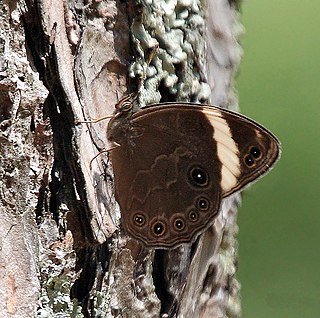
Lethe is a genus of butterflies in the subfamily Satyrinae of the family Nymphalidae. The genus was erected by Jacob Hübner in 1819. It includes the treebrowns, woodbrowns, foresters and their relatives. The species in the genus Lethe occur in temperate-tropical southern and eastern Asia, up to Indonesia and in North America.

The Satyrini is one of the tribes of the subfamily Satyrinae. It includes about 2200 species and is therefore the largest tribe in the subfamily which comprises 2500 species.

Lethe europa, the bamboo treebrown, is a species of Satyrinae butterfly found in Asia.

Lethe confusa, the banded treebrown, is a species of butterfly belonging to the satyr family that is found mainly in Southeast Asia and in parts of South Asia.

Lethe mekara, the common red forester, is a species of Satyrinae butterfly found in India and Southeast Asia.
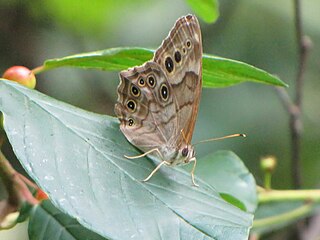
Enodia is a genus of butterflies of the subfamily Satyrinae in the family Nymphalidae.
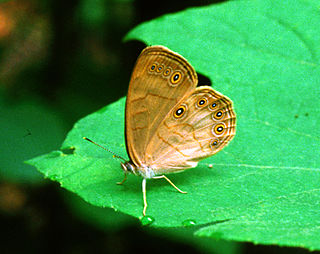
Satyrodes appalachia, the Appalachian brown or woods eyed brown is a species of Satyrinae butterfly that is native to North America.
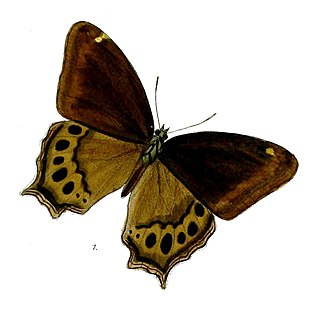
Lethe sura, the lilacfork, is a species of nymphalid butterfly found along the eastern Himalayas from Sikkim in India to northern Burma. It is also found in Southeast Asia

Enodia portlandia, the southern pearly eye, Portland pearlyeye or just pearly eye, is a butterfly of the family Nymphalidae. It is found in the United States from eastern Oklahoma and eastern Texas east through the southeast.
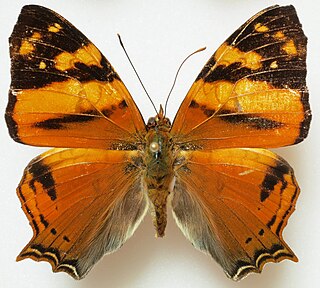
Hypanartia lethe, the orange admiral or orange mapwing, is a butterfly of the family Nymphalidae.

Lethe callipteris is a butterfly in the family Nymphalidae (Satyrinae). It is found in the East Palearctic where it is endemic to Japan, Sakhalin and the Kuriles.
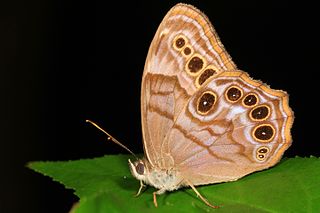
Lethe anthedon, the northern pearly-eye, is a species of butterfly of the subfamily Satyrinae in the family Nymphalidae. It is found in North America, from central Saskatchewan and eastern Nebraska east to Nova Scotia, south to central Alabama and Mississippi.

Lethe creola, the creole pearly-eye, is a species of brush-footed butterfly in the family Nymphalidae. It is found it the United States from North Carolina and central Georgia west to eastern Oklahoma and eastern Texas. Some authorities include this species in the genus Enodia as Enodia creola.

Lethe naga, the Naga treebrown, is a species of Satyrinae butterfly found in the Indomalayan realm where it occurs from Assam to Myanmar, Thailand and Laos It is named for the Naga hills.
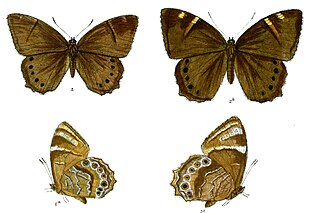
Lethe sidonis, the common woodbrown, is a species of Satyrinae butterfly found in the Indomalayan realm.
Lethe kabrua, the Manipur goldenfork, is a species of Satyrinae butterfly found in the Indomalayan realm where it is endemic to Manipur.

Lethe baladeva, the treble silverstripe, is a Satyrinae butterfly found in the Indomalayan realm. The species was first described by Frederic Moore in 1866.

Lethe tristigmata, the spotted mystic, is a species of Satyrinae butterfly found in the Indomalayan realm. In 2015, it was also recorded from Neora Valley National Park in West Bengal, India.

















